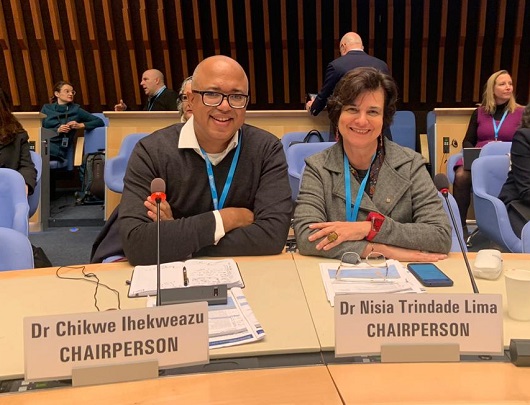Fiocruz takes part on WHO event on novel coronavirus
12/02/2020
Julia Dias (AFN)
Fiocruz takes part on a meeting of hundreds of scientists from all over the world at the headquarters of the World Health Organization (WHO), in Geneva, on February 11 and 12, to discuss how research can be used to intensify efforts to combat the novel coronavirus. Fiocruz's president, Nísia Trindade Lima, is one of the chairpersons of the last day sessions, which will define the priorities of a global research agenda.

President of Fiocruz, Nísia Trindade Lima, and National Coordinator/ Chief Executive Officer of the Nigeria Centre for Disease Control, Nigeria’s National Public Health Institute, Chikwe Ihekweazu.
"With 99% of the cases in China, this remains a major emergency for this country, but it also represents a very serious threat to the rest of the world," said World Health Organization Director-General, Tedros Adhanom Ghebreyesus, at the opening of the Global Research and Innovation Forum: towards a research roadmap.
The WHO R&D Blueprint is a global strategy and preparedness platform that drives coordinated development of drugs and vaccines before epidemics, and allows the rapid activation of R&D activities during epidemics. During the two days of the event, about 400 scientists will analyze ways to fight the epidemic, observing its transmission and possible treatments, vaccines and rapid tests.
They will also share their knowledge about the potential sources of the disease, which may have originated in bats and then migrated to other animals before reaching humans.
"The most important thing is to stop the epidemic and save lives. With your support, this is what we can do together," the WHO director-general told experts.
Tedros called on all countries to show "solidarity" by sharing the data at their disposal. "In order to overcome this epidemic, we need equitable sharing," he insisted.
The idea is that the meeting will result in a "roadmap" in terms of research, in which scientists and donors can align themselves, identifying gaps, drawing strategic directions, stimulating scientific collaborations and avoiding duplication of efforts.


